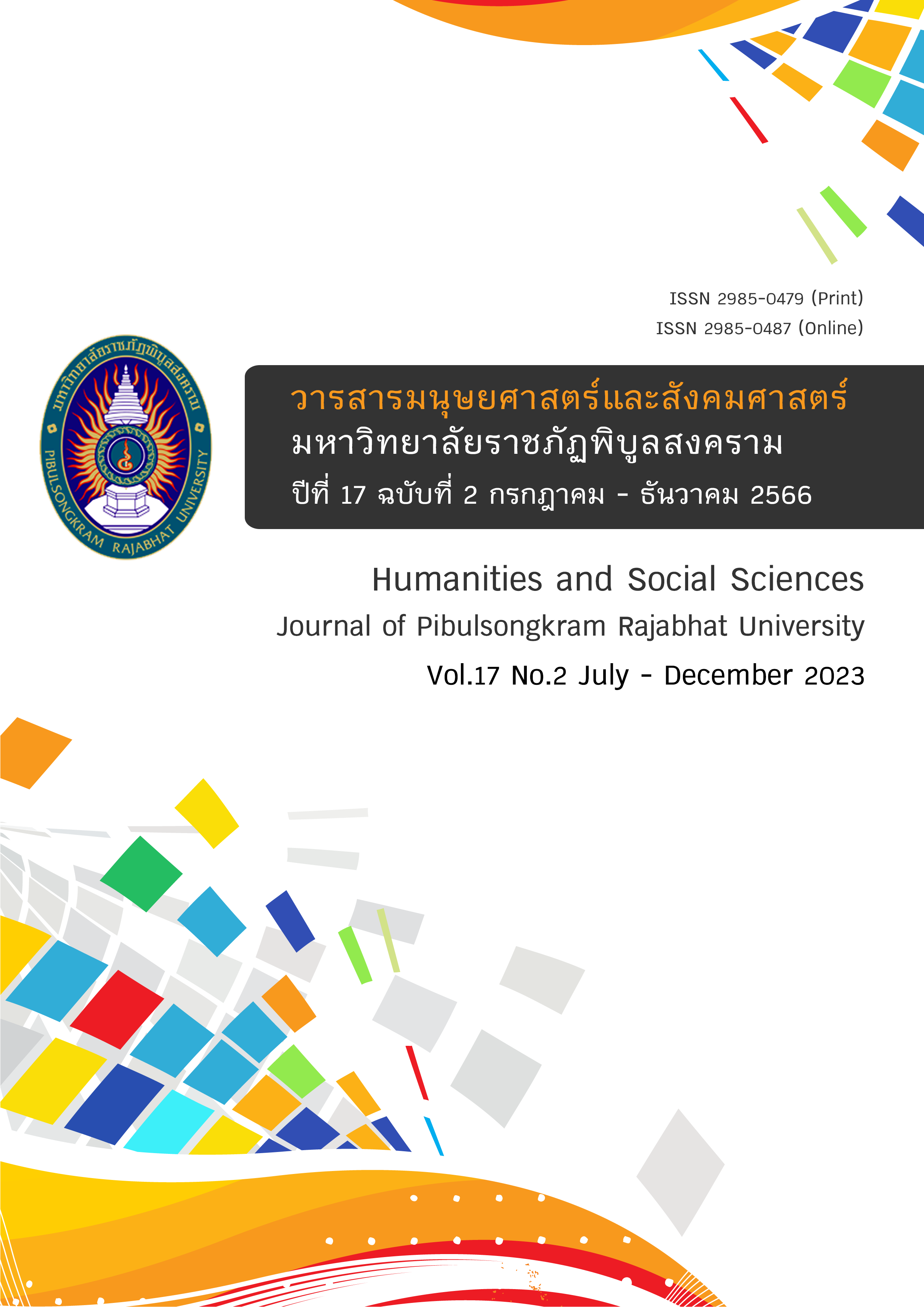The Development of a Training Course on the Development of Innovative School Curriculum of Secondary schools in the Eastern Economic Corridor
DOI:
https://doi.org/10.14456/psruhss.2023.54Keywords:
Innovation school curriculum, Special economic zone corridor school, Educational innovationAbstract
This research aims to 1) study the needs of the development of innovative school curriculum, 2) develop and find the effectiveness of training courses, and 3) study the satisfaction of the training courses. Methods for researching the nature of research and population development are teachers and educational personnel. Secondary schools in the Eastern Economic Corridor of the Eastern Region included 920 students. The samples were teachers and educational personnel. 30 secondary schools in the Eastern Economic Corridor. The research instruments were questionnaires, training courses. Knowledge test And satisfaction questionnaire The statistics used for data analysis were percentage, mean, standard deviation. And the t-value test The results of the research were as follows: 1) Teachers and educational personnel need innovative school curriculum development. The overall picture is at a high level. The average value was 4.41. 2) The training program consisted of 7 components: training objectives, content, and structure, duration of training activities. Training materials Measuring and evaluating learning outcomes The training courses were as effective as 79.10/80.28, and the teachers and educational personnel who received the training had higher scores on the knowledge of the development of the innovative school curriculum after the training was higher than before the training. With statistical significance at the level. 01 and 3) teachers and educational personnel. The overall satisfaction with the training courses was at the highest level.
References
จีรศักดิ์ หมุนขำ. (2563). การพัฒนาหลักสูตรฝึกอบรมฐานสมรรถนะด้านการจัดการเรียนรู้สำหรับครูผู้ช่วยในสถานศึกษาสังกัดสำนักงานคณะกรรมการอาชีวศึกษาโดยวิธีการเรียนรู้แบบมีส่วนร่วม. วารสารวิจัยและนวัตกรรมการอาชีวศึกษา, 4(1), 89-96.
ณัฐพล บัวเปลี่ยนสี. (2561). รูปแบบการพัฒนาบุคลากรในพื้นที่ระเบียงเศรษฐกิจพิเศษภาคตะวันออกเพื่อรองรับอุตสาหกรรมเป้าหมายในอนาคต. วารสารวิชาการ สถาบันเทคโนโลยีแห่งสุวรรณภูมิ, 4(1), 303-315.
ทวีศักดิ์ หงษ์เจริญ, และนันทรัตน์ เจริญกุล. (2563). ความต้องการจำเป็นของการบริหารโรงเรียนในเขตพัฒนาเศรษฐกิจพิเศษจังหวัดสระแก้วตามแนวคิดคุณลักษณะที่พึงประสงค์ของผู้เรียน. วารสารการบริหารและนวัตกรรมการศึกษา, 3(1), 40-60.
บุญชม ศรีสะอาด. (2560). การวิจัยเบื้องต้น (พิมพ์ครั้งที่ 10). กรุงเทพฯ: สุวีรยาสาส์น.
สำนักงานคณะกรรมการนโยบายเขตพัฒนาพิเศษภาคตะวันออก. (2561). แผนปฏิบัติการการพัฒนาบุคลากร การศึกษาการวิจัย และเทคโนโลยีรองรับการพัฒนาเขตพิเศษภาคตะวันออก. กรุงเทพฯ: สำนักงานคณะกรรมการนโยบายเขตพัฒนาพิเศษภาคตะวันออก.
สำนักงานพัฒนาวิทยาศาสตร์และเทคโนโลยีแห่งชาติ. (2560). รายงานการศึกษาความเหมาะสม (Feasibility Study) การจัดตั้งเขตส่งเสริมเศรษฐกิจพิเศษเขตนวัตกรรมระเบียงเศรษฐกิจพิเศษภาคตะวันออก. กรุงเทพฯ: กระทรวงวิทยาศาสตร์และเทคโนโลยี.
สำนักนโยบายและยุทธศาสตร์. (2561). แผนปฏิบัติราชการพัฒนาการศึกษาในพื้นที่เขตพัฒนาพิเศษภาคตะวันออก ประจำปีงบประมาณ พ.ศ. 2561 ของกระทรวงศึกษาธิการ. กรุงเทพฯ: สำนักงานปลัดกระทรวงศึกษาธิการ.
สุธน วงค์แดง, ภาณุมาส เศรษฐจันทร์, และวีระพงษ์ สิงห์ครุธ. (2561). การพัฒนาหลักสูตรฝึกอบรมเพื่อเสริมสร้างทักษะการเรียนรู้ในศตวรรษที่ 21 สำหรับนักศึกษาครู มหาวิทยาลัยราชภัฏกลุ่มรัตนโกสินทร์. วารสารวิชาการและวิจัยสังคมศาสตร์, 13(37), 75-90.
Bloom, B. S. (1976). Human characteristics and school learning. New York: McGraw-hill.
Cronbach, L. J. (1970). Essentials of Psychological Testing. New York: Harper and Row.
Keegan, A., Ringhofer, C., & Huemann, M. (2018). Human resource management and project based organizing: Fertile ground, missed opportunities and prospects for closer connections. International Journal of Project Management, 36(1), 121-133.
Likert, R. (1967). The Method of Constructing and Attitude Scale. New York: Wiley & Son.
Luankaew, K. (2019). Removing education management lessons for the development of special economic zones of India. Retrieved March 10, 2019, from https://www.bangkokbiznews.com/blog/detail/645634.
Sanghi, S. (2016). The handbook of competency mapping: understanding, designing and implementing competency models in organizations. India: SAGE publications.
Taba, H. (1962). Curriculum Development: Theory and Practice. New York: Harcourt Brace & World.
Tyler, R. (1971). Basic principles of curriculum and instruction. Chicago: The University of Chicago Press.
Downloads
Published
How to Cite
Issue
Section
License
Copyright (c) 2021 Humanities and Social Sciences Journal of Pibulsongkram Rajabhat University

This work is licensed under a Creative Commons Attribution-NonCommercial-NoDerivatives 4.0 International License.
Any articles or comments appearing in the Journal of Humanities and Social Sciences, Rajabhat Phibulsongkram University, are the intellectual property of the authors, and do not necessarily reflect the views of the editorial board. Published articles are copyrighted by the Journal of Humanities and Social Sciences, Rajabhat Phibulsongkram University.









